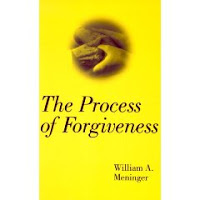
Order the Assessment!
Evans Food Sensitivity Assessment for Adults

What do you do to manage your anger when you can feel it rising in your body? Do you lash out at what you believe is the cause or do you suck it up and say nothing? How does your anger get in the way of your ability to offer forgiveness to the people in your life? At my retreat over the weekend I learned many things and one of them was about the process of anger.
In his book “The Process of Forgiveness”, William Meninger describers anger as a “defense mechanism which, when uncontrolled, takes on an animal-like aspect. Its purpose is to forcefully intimidate another into doing something we want. Rarely is it compatible with forgiveness or love.” He suggests that all of our anger is related to frustation of one of three different human desires: the desire for security, the desire for control or the desire for approval. I found it interesting to think back on the many places in my life where I have become angry to see if what he suggests is true. I concluded that each of my incidents did, in fact, reflect one of these unmet desires.
Mr. Meninger makes an important distinction between actual control, security and approval and the desire for them “To deal with our desire is always within our power. It is the desire, not the control itself, that is responsible for anger. ” For example, if your child wants to borrow your car and gets very pushy and demanding in his requests, your natural reaction is to push back and refuse to give in to his demands. Your “desire to control” is turned on and anger is the result. Once you are aware that this is what is happening, you can simply take a deep breath or two and notice what you are feeling. If you take a minute to calm yourself, notice the feelings you are experiencing in your body, and then quietly say to yourself, ” I let go of my desire for control” you will find the feelings dissipating. Once you are calmer and more centered, you are better able to think rationally about a plan of action and respond in a calmer and more loving manner. Notice you never gave up your actual control in the circumstance. You only stopped the natural human instinct of wanting to step up and control something with a quick, knee jerk reaction. After a minute or two hesitation and a chance to regroup, you can better figure out how to actually control the situation from a more loving place.
I found this distinction between the desire for something and the actual doing of it interesting. I can see how it is my animal instinctual desire for something that kicks in before my rational mind has time to think clearly. I have been practicing this over the last couple of days and have noticed a big difference in the energy I feel when frustrated with a circumstance. Give it try and see how it works for you. Take a minute or two to notice whether it is your desire for control, for security or for acceptance that is driving the energy of your anger. After a few deep breaths, repeat the words in your head a few times, “I let go of my desire to control” and notice if the anger begins to slip away. Once you are calmer, then decide the appropriate course of action. I am sure the plan of action you arrive at will be much better than the one born out of anger.
It is almost impossible to forgive someone when you are harbouring a huge amount of anger toward them. Perhaps if we all are better at managing our anger in the moments when it appears, the feeling won’t escalate over time and we will be quicker to forgive the people in our life.